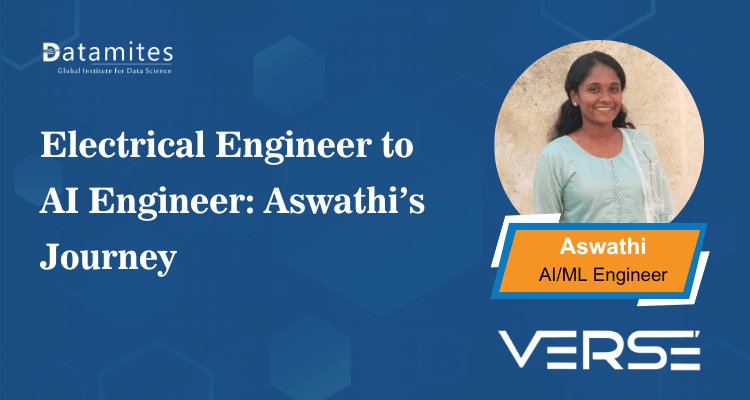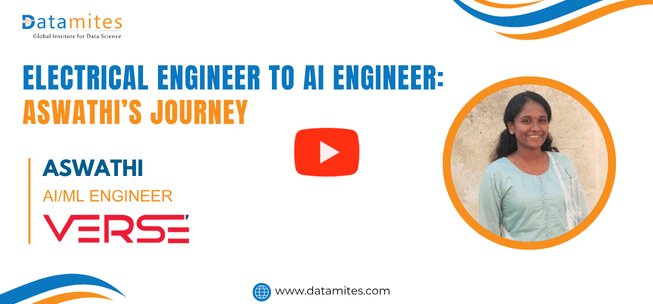Aswathi’s Journey: From Electrical Engineer to AI/ML Engineer
Aswathi’s journey from an electrical engineer to an AI/ML engineer is a powerful example of career transformation through determination and upskilling.

In a world where technology is evolving at lightning speed, career transitions are no longer a rarity; they're a necessity. Meet Aswathi, an electrical engineer who dared to dream beyond the boundaries of her degree. With a curious mind and a passion for innovation, she took a bold leap into the world of Artificial Intelligence. Her journey from circuit boards to neural networks isn’t just inspiring, it's proof that with the right mindset and upskilling, anything is possible. If you've ever wondered whether it's too late to switch careers, Aswathi’s story might be the spark you need.
Q&A with Aswathi: How She Successfully Switched Careers into AI/ML
In this Q&A session, we speak with Aswathi, who shares her inspiring journey of transitioning from a non-technical background into the world of AI/ML.
Q1: Aswathi, can you briefly introduce yourself and your background?
I graduated in 2018 with a degree in Electrical Engineering. Initially, I prepared for government service exams for about two years. Eventually, I realized my true interest lay in the field of computer science. I worked at WhiteHat Jr as a coding instructor for three years, teaching students the basics of Python, website creation, and more. Later, I also did a 6-month internship as a data analyst assisting a professor in research.
Q2: How did you discover your passion for artificial intelligence?
While teaching at WhiteHat Jr, I was introduced to basic Python programming, HTML, CSS, JavaScript, and even a few surface-level data science concepts. Though the topics were very basic as they were meant for students in grades 4 to 6 I found them intriguing. That initial exposure sparked my curiosity, and I started exploring AI further. That’s when I decided to transition into this field more seriously.
Q3: Being from a non-CS background, did you face any unique challenges?
Yes, definitely. Coming from an electrical engineering background meant I had to start many things from scratch. However, because of my prior teaching experience in coding, I had an edge. Ironically, many people from mechanical and electrical backgrounds show greater interest and capability in coding than some from computer science. Perhaps it's the effort we put in to catch up that drives our passion.
Q4: Can you share a bit about your placement and new role?
I received a job offer from Verse Innovations(One India) as an AI/ML Engineer. The interview process tested my coding logic, understanding of machine learning concepts, and real-world problem-solving skills. Thanks to the hands-on preparation in the course and mock interviews, I was able to perform confidently.
Q5: How did you handle learning statistics and machine learning?
Statistics felt relatively easy. I followed the DataMites curriculum and used ChatGPT to strengthen my understanding. Machine learning, however, required a more nuanced approach. Every algorithm has its own hyperparameters and characteristics, so I practiced with different datasets to get a strong grip on each method.
Q6: Did you participate in live projects? If so, which one?
Yes, I did. The major live project was the ITSM Ticket Management System, where we handled real-time data and applied everything we learned to solve a business problem. It was a two-person team effort and gave me a taste of what actual project execution in the industry feels like.
Q7: What was your "job readiness score" and how did mock interviews help?
My job score was around 5.6 to 6 out of 8, which I believe is a solid number. Mock interviews played a significant role in boosting my confidence. After those sessions, I improved my understanding of key concepts and performed better in real interviews. Feedback from mock interviewers helped elevate my job readiness.
Q8: How many interviews did you attend, and how was your overall job placement experience?
I attended two interviews before completing the DataMites course; these were external applications. After completing the course and taking mock interviews, I cracked the job opportunity that came through DataMites. In total, I got two real job opportunities and successfully landed a role soon after course completion.
Q9: How long did it take you to land your first job after the course?
I got placed within 8 months of completing the DataMites course. What’s noteworthy is that I was job-ready immediately after finishing the course. The learning curve was steep, but structured mentorship, real projects, and mock interviews made a big difference.
Q10: What was the toughest interview question faced, and how was it handled?
The toughest question was on Natural Language Processing (NLP), an area where the candidate was not confident. However, honesty and willingness to learn helped manage the situation. Being upfront about weaker areas while showing a learning mindset can still leave a good impression.
Q11: What was the toughest interview question you faced, and how did you handle it?
One of the toughest questions was related to Transformers and associated libraries. Even though I had only basic knowledge, I tried to piece together an answer using what I understood. I didn’t let uncertainty stop me. I presented a response based on my reasoning. That’s often how interviews work; you may not always know the perfect answer, but showcasing your thought process matters. Once you’ve completed capstone projects, you begin to get an intuitive sense of how to approach these kinds of application-level problems.
Q12: How long did it take to prepare for data analytics interviews?
It took me about one and a half months to prepare thoroughly. From the day I joined DataMites, I made it a point to learn each topic deeply and reflect on how I would explain or answer related questions if asked in an interview. This proactive preparation, even before completing the course, helped me a lot. Once the project phase was done, I had a clear idea of what to expect in interviews.
Q13: What tips would you give to other aspiring AI professionals?
- Practice regularly: Especially Python. It’s not enough to just know the syntax; you need to apply logic.
- Master the basics: Don’t skip statistics and core concepts; they are essential for understanding ML algorithms.
- Be curious: Explore datasets and try to apply what you’ve learned to real-world problems.
- Stay consistent: AI is vast, but with daily effort and the right guidance, you’ll see progress.
Refer these below articles:
- From Mechanical Engineer to AI/ML Engineer: Uday Bhaskar’s Journey
- From PhD to NLP Data Scientist: Samir’s Career Reinvention Journey
- From Digital Marketer to AI Engineer – Amar Sharma’s Inspiring Journey
Key Takeaways from Aswathi’s Transition into AI/ML Engineer
We highlight the key takeaways from Aswathi’s transition lessons that can guide aspiring professionals looking to make their own move into the field of artificial intelligence and machine learning.
- Non-CS Backgrounds Can Thrive in AI: Aswathi, an Electrical Engineering graduate, successfully transitioned into AI/ML, proving that non-CS professionals can excel with the right mindset and training.
- Early Exposure Sparked Curiosity: Teaching coding to young students introduced her to Python and basic data science concepts, which ignited her interest in AI.
- Prior Coding Experience Was an Advantage: Her role as a coding instructor gave her a foundational edge when diving deeper into AI and machine learning.
- Self-Initiated Learning Matters: Aswathi emphasized the importance of exploring beyond the curriculum using tools like ChatGPT and practicing with datasets helped her grasp complex ML concepts.
- Live Projects Boost Industry Readiness: Participating in a real-time ITSM Ticket Management System project offered hands-on exposure to solving business problems with data.
Read these below articles:
- Exploring the Growing Artificial Intelligence Demand in Raipur
- The Growing Demand for Artificial Intelligence in Ranchi
- The Rising Demand for Artificial Intelligence in Kozhikode
Aswathi’s shift from electrical engineering to AI engineering shows that passion and persistence can lead to success even without a computer science degree. With the right support and hands-on learning, anyone can enter this growing field. According to Grand View Research, the global AI market is expected to grow from USD 279.2 billion in 2024 to USD 1.81 trillion by 2030, at a CAGR of 35.9%.
Artificial Intelligence courses in Coimbatore offer a wide range of options for both beginners and experienced professionals. Combining theoretical foundations with hands-on training, these programs are designed to equip learners with the essential skills needed to thrive in today’s AI-powered landscape.
DataMites Artificial Intelligence Institute in Coimbatore, designed to equip learners with essential skills and industry-relevant knowledge. Recognized by Analytics India Magazine as one of the top AI training providers in India alongside institutions like IIT and IIM, DataMites has earned a strong reputation in AI education. Upon completing the course, students receive globally recognized certifications from IABAC and NASSCOM FutureSkills, boosting their credibility and career prospects in the competitive job market.

